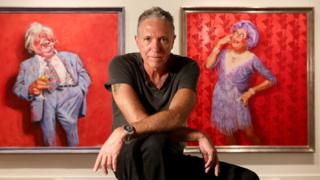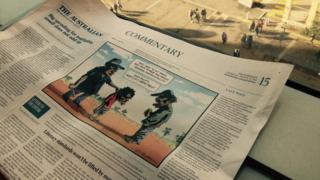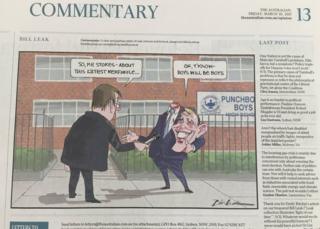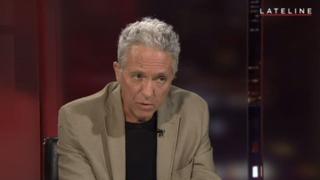 Image copyright News Corp Australia Image caption Bill Leak has been celebrated for his wit and distinctive style
Image copyright News Corp Australia Image caption Bill Leak has been celebrated for his wit and distinctive style
Loved and loathed, he was to his admirers a genius of wit and originality who confronted tough topics, while to his detractors he fuelled race tensions and polarised a nation.
Bill Leak, who created some of Australia’s most recognisable and inflammatory cartoons, has died of a suspected heart attack in hospital. He was 61.
Last year, his caricature of an indigenous man with a beer can who could not remember his son’s name was labelled “disgusting” and “discriminatory” by Aboriginal leaders. The artist had also faced death threats and was forced to move out of his home after publishing an image of the Prophet Muhammad following the Charlie Hebdo attacks in Paris.
“[He was] a giant in his field of cartooning and portraiture and a towering figure for more than two decades,” said Paul Whittaker, editor-in-chief of The Australian newspaper, where Mr Leak worked.
The cartoonist was born in Adelaide but raised near Sydney, where he trained at the Julian Ashton Art School in the city’s historic Rocks district. He would later travel to Europe to soak up the region’s art, and it was in the early 1980s that he got his big break with The Bulletin magazine.
 Image caption Bill Leak’s most controversial cartoon sparked a racial discrimination complaint last year
Image caption Bill Leak’s most controversial cartoon sparked a racial discrimination complaint last year
“He had terrific control over the pen. He also had a mind which seemed uncontrollable. It would go in any direction and he was totally unpredictable, so it was combination of his drawing skills and his quirky sense of humour,” Mr Foyle told the BBC.
“I don’t think Bill was ever surprised about the controversy he caused. He enjoyed it and on many occasions tailored his cartoons to cause a stink. Bill enjoyed being in the limelight.”
Mr Leak won nine Walkley awards that recognise journalistic excellence in Australia, and had worked for Rupert Murdoch’s News Corp Australia newspapers since 1994.
His distinctive style won many fans, but he often drew intense criticism for his views – particularly in recent years. Last year’s depiction of the indigenous man sparked a complaint to Australia’s Human Rights Commission, with a claim it had violated a controversial race discrimination law.
One indigenous advocacy group at the time called the “disgusting, disrespectful, and hurtful”, adding: “Those involved in publishing such a clearly racist cartoon should be ashamed and should issue a public apology to all Australians.”
Emotional reactions
Tributes on social media have praised his fearlessness, lamenting the loss of an artist who was “supremely talented, principled, brave, witty & decent”, and “a true warrior for freedom of speech”.
Others, though, had far more brutal assessments. Several posts after his death did not just attack Mr Leak’s views, but the cartoonist personally – demonstrating how polarising he had become within sections of the community. Others swiftly condemned the critical posts.
 Image copyright @annabelcrabb
Image copyright @annabelcrabb  Image copyright @JacquiLambie
Image copyright @JacquiLambie
Those close to Mr Leak say while he made a career rattling cages, an avalanche of criticism of his work in recent years had become too heavy a burden.
“Basically he was hounded to his death. He’s had the most incredibly stressful couple of years,” Spectator Australia editor and long-time friend Rowan Dean told the BBC.
“There were death threats after he did a cartoon that showed the Prophet Muhammad, which led to him having to move his house. He was Australia’s version of Salman Rushdie for a while.”
‘Racist’ cartoon draws praise and criticism The racial discrimination law dividing Australia
“He did a very poignant but accurate cartoon about Indigenous Australians, disadvantage and the lack of parenting amongst Indigenous Australians and for that he was hounded mercilessly by our Australian Human Rights Commission. The pressure that he was under was just enormous.”
Defending his cartoon at the time, Mr Leak wrote: “I was trying to say that if you think things are pretty crook for the children locked up in the Northern Territory’s Don Dale Youth Detention Centre, you should have a look at the homes they came from.”
 Image caption Leak’s final cartoon accused education minister Rob Stokes of ignoring radicalisation in Australian schools
Image caption Leak’s final cartoon accused education minister Rob Stokes of ignoring radicalisation in Australian schools
Many of his fellow cartoonists share the thought that Mr Leak was pilloried to the point of submission.
Mark Tippett, a Sydney-based caricature artist, told the BBC that his death was a terrible reminder of the battles they often face.
“What do we do as satirists if we can’t satire anymore?” he asked. “Do we have to ask permission before we can put pen to paper? It just can’t go on this way. It [his death] makes us more defiant. We can’t go into a shell.”
“What he was trying to do is make his messages as simplistic as possible for many people to understand. His style would appeal to the masses because it was so clean and recognisable. You just don’t see that every day.”
Prime Minister Malcolm Turnbull has remembered his friend of more than 30 years.
“I can’t believe that Bill Leak is dead,” Mr Turnbull posted on Facebook. “Who had more life, more energy than him? So many more cartoons to draw, paintings to paint, politicians to satirise.”
 Image copyright ABC Image caption Mr Leak in a recent interview on Australian television
Image copyright ABC Image caption Mr Leak in a recent interview on Australian television
Indigenous leader Warren Mundine said Mr Leak “was just an incredible cartoonist”. He told the Australian Broadcasting Corp: “I’m just in shock. I was only with him the other night at his book launch and had a beer with him.”
Left behind are the cartoonist’s wife Goong, his stepdaughter Tasha and his sons Johannes and Jasper.
His friends have remember a gifted man.
“Bill was an absolute genius,” said Mr Dean. “Here was a man who was one of Australia’s greatest political talents. Probably one of the world’s greatest satirists, certainly a brilliant cartoonist and also a brilliant portrait painter.”






